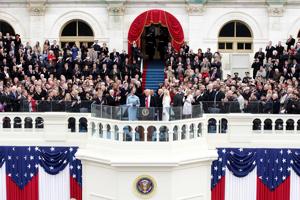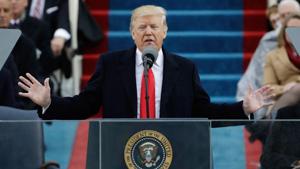President Donald Trump Inauguration
Donald Trump's first inauguration as the 45th president of the United States took place on January 20, 2017. This significant event marked the beginning of his first term in office and was characterized by a series of traditional ceremonies and celebrations.
Inauguration Day Overview
Date: January 20, 2017
Location: West Front of the United States Capitol, Washington, D.C.
Key Participants:
- Donald Trump, President
- Mike Pence, Vice President
- Chief Justice John Roberts administered the presidential oath of office.
- Associate Justice Clarence Thomas administered the vice-presidential oath.
Key Events
The inauguration included several notable components:
Swearing-In Ceremony: At precisely noon, Donald Trump took the oath of office with his left hand on two Bibles—one belonging to him and the historic Lincoln Bible.
This moment was followed by a 21-gun salute and the Marine Band performing "Hail to the Chief."
Inaugural Address: In his speech, Trump painted a stark picture of America, referring to "American carnage" and emphasizing issues like job loss and poverty.
He pledged to prioritize the needs of "forgotten men and women" and criticized the political establishment for neglecting ordinary citizens.
Parade and Celebrations: Following the ceremony, Trump and Pence participated in a parade along Pennsylvania Avenue, which featured over 8,000 participants from various organizations.
The day concluded with multiple inaugural balls attended by Trump and his family.

Historical Context
Trump's inauguration was notable not only for its content but also for its historical significance. At 70 years old, Trump became the oldest person to assume the presidency at that time.
His inaugural address diverged from traditional themes of optimism, instead focusing on a populist message that resonated with many Americans who felt disenfranchised.
Looking ahead, Trump is set to be inaugurated again on January 20, 2025, marking his return to office as the 47th president after winning the election in November 2024.
This upcoming event will be particularly historic as it represents his second non-consecutive term in office.
What were the main themes of Trump's 2017 inaugural address
Donald Trump's inaugural address on January 20, 2017, was marked by several prominent themes that diverged from traditional presidential speeches. Here are the main themes:
Populism and Nationalism: Trump positioned himself as a champion of the "forgotten men and women" of America, emphasizing that the political elite had neglected their needs. He declared, "January 20th, 2017, will be remembered as the day the people became the rulers of this nation again," highlighting his populist approach to governance.
"American Carnage": A striking phrase from his speech, "American carnage," encapsulated his portrayal of a nation in decline. He painted a grim picture of poverty, crime, and abandoned factories, asserting that this situation would end under his leadership. This theme served to rally support by invoking a sense of urgency and crisis.
America First: Trump introduced the mantra "America First," which would become a cornerstone of his administration. He promised that all decisions regarding trade, immigration, and foreign policy would prioritize American workers and families. This theme underscored a shift towards protectionism and national self-interest in international relations.
Restoration of American Strength: The address included a commitment to rebuilding the nation's infrastructure and economy. Trump pledged to bring back jobs and wealth to America by focusing on domestic production and labor, encapsulated in his call to "Buy American and Hire American."
Unity and Patriotism: Despite the darker themes, Trump called for national unity, stating that when Americans are united, they are "totally unstoppable." He encouraged open debate while fostering solidarity among citizens.
Critique of Previous Administrations: Trump criticized the past administrations for their failures, particularly in terms of economic management and foreign policy. He highlighted the disconnect between the prosperity enjoyed by politicians in Washington and the struggles faced by ordinary Americans.
In summary, Trump's inaugural address was characterized by its populist rhetoric, dark portrayal of national issues, emphasis on prioritizing American interests, and a call for unity amidst significant challenges. These themes set the tone for his presidency and resonated with many of his supporters.